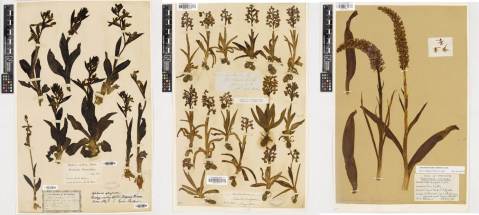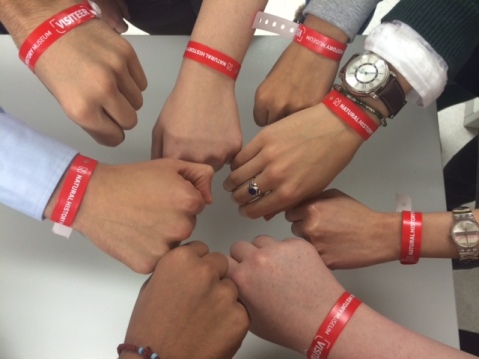Visiteering with Orchid Observers at the Natural History Museum
We’ve already had a fantastic response from the amateur naturalist and professional botanical community, alongside nature loving citizen scientists, who went out all over the country to photograph orchids flowering in 2015, and submit their images and records to the project – thank you. Many of you have also been engaged in the online identification of species and tagging flowering stages in the uploaded images, as well as transcribing data from our extensive Museum herbarium collection, but with around10,000 historical orchid specimens in our collection there is still a lot of useful data to extract.
In October, to help us speed up our goal to annotate all the specimen data for the Orchid Observers research, we invited anyone interested in volunteering a day of their time to work alongside a scientist from the Orchid Observers research team here in the Museum to help with this task!

Visiteering is a new strand to the volunteer offer at the Natural History Museum which invites small groups of volunteers into the Museum for a day to for a genuine collections-based experience and a chance to support the Museum’s work. Visiteers are set a challenge relating to the collections and work along museum scientists.
We piloted the first ever Visiteer day in October with the Orchid Observers project and challenged each visiteer to verify or transcribe data for 50 or more museum orchid specimens on the Orchid Observers website.
Since October we have offered 7 Visiteering days for up to 10 people. Over 300 people registered their interest to get involved and a total of 56 volunteers have taken part in checking and transcribing data for our orchid specimens; collectively they succeeded in annotating 3,424 specimens!

Liberating the data: some examples of our historical orchid specimen sheets which our visiteer groups helped to annotate
Some highlights from Visiteering with Orchid Observers:
- On a scale of 1-10, participants were either likely (8) to extremely likely (9-10) to continue verifying/transcribing from home.
- All participants understood the value of their contribution and the ambitions of Orchid observers.
- Practical skills gained ranged from: transcribing herbarium sheets, to deciphering handwriting and investigation skills, cross referencing and information searches.
- New knowledge gained: identifying UK wild orchid species and their Latin names, knowledge of UK places, Vice counties and geography, impact of climate change on UK orchid species, plant and specimen preparation, data sorting
Feedback from visiteers: What did you most enjoy about your visiteer day?
‘I found it very satisfying to complete a transcription’
‘…the feeling that my time has been used for a worthwhile cause’
‘I’ve learned about the way scientific data is collected and collated. Visiting the NHM behind the scenes fulfils a lifelong dream…’
‘…feeling we were part of the whole scientific process…’
‘Joyful organizers, loads of background information, feeling useful J’
‘..meeting and spending the day with awesome people!’
‘Everything’

Some of our many lovely visiteers with Orchid Observers
A giant THANK YOU to all our visiteers who came into the Natural History Museum to offer their time to the Orchid Observers project, and for your valuable and lasting contribution to the Museum and our research.
And a special big thank you to Ali Thomas, Volunteer Manager extraordinaire! And to all the Museum teams who made Visiteering possible.

3 responses to “Visiteering with Orchid Observers at the Natural History Museum”
Trackbacks / Pingbacks
- - February 19, 2016

It’s a pity it’s not possible to zoom in enough to do this on an iPad. I would imagine a great many more contributions would be made possible if this where so. As it is I shall have to move on to another project.
LikeLike
Thanks for your feedback Che – I’m afraid the website isn’t optimised for tablets or phones, and we are really sorry you’ve found it too difficult to take part because of this. We will take this feedback on board and work to make future projects more mobile/tablet-friendly. Hope you enjoyed the other projects.
All the best,
Lucy
LikeLike